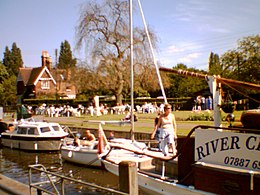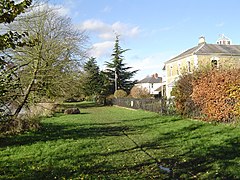| Revision as of 15:56, 24 September 2008 edit194.176.201.28 (talk)No edit summary← Previous edit | Revision as of 16:31, 8 January 2009 edit undoQui1che (talk | contribs)Autopatrolled, Extended confirmed users, Pending changes reviewers11,002 edits Added coords, Notes section, cite templates, grid reference; minor text editsNext edit → | ||
| Line 1: | Line 1: | ||
| {{Infobox Waterlock | {{Infobox Waterlock | ||
| |lock_name = Shepperton Lock<ref> |
|lock_name = Shepperton Lock<ref>{{Cite book|url= http://www.visitthames.co.uk/uploads/a_users_guide_to_the_River_thames.pdf|title= A User's Guide to the River Thames|chapter= Part II|accessdate= 2009-01-08|publisher= ]|location= ]|year= 2006|oclc= 76817915}}</ref> | ||
| |image= Sheppertonlock.jpg|right|thumb|150px|]] | |image= Sheppertonlock.jpg|right|thumb|150px|]] | ||
| |caption= Shepperton lock (2005) | |caption= Shepperton lock (2005) | ||
| Line 21: | Line 21: | ||
| | map_text= | | map_text= | ||
| | map_width= | | map_width= | ||
| | coordinates= {{coord|51|22|55.5|N|00|27|31|W|region:GB-SRY_type:landmark_scale:5000|display=inline,title}} | |||
| | coordinates= | |||
| | lat= | | lat= | ||
| | long= | | long= | ||
| Line 27: | Line 27: | ||
| }} | }} | ||
| {{Shepperton Lock map}} | {{Shepperton Lock map}} | ||
| '''Shepperton Lock''' is a ] on the ], in England adjoining the northern bank near ], ] (formerly ]). It is across the river from ] but not directly accessible from there. | '''Shepperton Lock''' is a ] on the ], in England adjoining the northern bank near ], ] (formerly ]). It is across the river from ], but not directly accessible from there. | ||
| In 1813, the ] built the ] on a cut along an existing watercourse to create ]. | In 1813, the ] built the ] on a cut along an existing watercourse to create ]. | ||
| Line 36: | Line 36: | ||
| ==History== | ==History== | ||
| A weir is recorded at Shepperton in the 1086 ] but this is unlikely to have been on the tidal Thames itself. There is also reference to a sluice or dam at Shepperton in 1293 and tolls being raised on passing ships, but the geography of the area is likely to have changed and these do not appear to refer to the site of the current lock. The lock was built in 1813 on the site of a small watercourse known as Stoner's Gut which ran across the neck of a hook in the river as it went to Weybridge. This channel was considered a nuisance to navigation and was not considered for use as the main channel as barges usually went to Weybridge or the ]. Various accounts at the end of the 18th century record flood waters cutting through the gut and it is believed that there was a little wooden church built on piles over the river which was washed away. The gut was dammed and in 1805 came the first suggestion for a lock. After strong opposition, the proposal was put forward again in 1809 and a wooden lock was subsequently built.<ref> |
A weir is recorded at Shepperton in the 1086 ] but this is unlikely to have been on the tidal Thames itself. There is also reference to a sluice or dam at Shepperton in 1293 and tolls being raised on passing ships, but the geography of the area is likely to have changed and these do not appear to refer to the site of the current lock. The lock was built in 1813 on the site of a small watercourse known as Stoner's Gut which ran across the neck of a hook in the river as it went to Weybridge. This channel was considered a nuisance to navigation and was not considered for use as the main channel as barges usually went to Weybridge or the ]. Various accounts at the end of the 18th century record flood waters cutting through the gut and it is believed that there was a little wooden church built on piles over the river which was washed away. The gut was dammed and in 1805 came the first suggestion for a lock. After strong opposition, the proposal was put forward again in 1809 and a wooden lock was subsequently built.<ref>{{cite book |title= The Thames Highway: Volume II Locks and Weirs|last= Thacker|first= Fred S|year= 1968|origyear= First published 1920|edition= New impression, 1st.|publisher= ]|location= ]|isbn= 9780715342336|oclc= 55209571}}</ref> A stone lock was built in 1899, next to the existing wooden one which was then filled in and removed. | ||
| There was formerly a small island called Dog Ait at this point. This became corrupted into the name "Dockett" as in Dockett Eddy Lane. | There was formerly a small island called Dog ] at this point. This became corrupted into the name "Dockett" as in Dockett Eddy Lane. | ||
| ==Access to the lock== | ==Access to the lock== | ||
| Line 49: | Line 49: | ||
| ===Thames Path=== | ===Thames Path=== | ||
| The ] follows the northern (Middlesex) bank all the way to Chertsey Lock. | The ] follows the northern (Middlesex) bank all the way to Chertsey Lock. | ||
| ==Literature and the Media== | ==Literature and the Media== | ||
| The lock in ] '']'' at Plashwater Mill is based on Shepperton lock. | The lock in ] '']'' at Plashwater Mill is based on Shepperton lock. | ||
| Line 59: | Line 57: | ||
| ==See also== | ==See also== | ||
| *] | *] | ||
| *] | *] | ||
| == |
== Notes == | ||
| {{Reflist}} | {{Reflist}} | ||
| * | |||
| ==References== | |||
| *{{Cite web |url= http://www.riverthames.co.uk/about_thames/3763.htm|title= Shepperton Lock|accessdate= 2009-01-08|publisher= The River Thames Guide}} | |||
| {{Surrey-geo-stub}} | {{Surrey-geo-stub}} | ||
| Line 72: | Line 70: | ||
| {{Start box}} | {{Start box}} | ||
| {{River lock start|River=]}} | {{River lock start|River=]}} | ||
| {{River lock line|upstream=]<br/>2.06miles|downstream=]<br/>2.95 miles|location= |
{{River lock line|upstream=]<br/>2.06miles|downstream=]<br/>2.95 miles|location= TQ0725465964}} | ||
| {{End box}} | {{End box}} | ||
Revision as of 16:31, 8 January 2009
| Shepperton Lock | |
|---|---|
 Shepperton lock (2005) Shepperton lock (2005) | |
| 51°22′55.5″N 00°27′31″W / 51.382083°N 0.45861°W / 51.382083; -0.45861 | |
| Waterway | River Thames |
| County | Surrey |
| Maintained by | Environment Agency |
| Operation | Hydraulic |
| First built | 1813 |
| Latest built | 1899 |
| Length | 174' 5" (53.16m) |
| Width | 19' 10" (6.04m) |
| Fall | 6' 8" (2.03m) |
| Above sea level | 33' |
| Distance to Teddington Lock | 10 miles |
| Power is available out of hours | |
| Shepperton Lock | |||||||||||||||||||||||||||||||||||||||||||||||||||||||||||||||||||||||||||||||||||||||||||||||||||||||||||||||||||||||||||||||||||||
|---|---|---|---|---|---|---|---|---|---|---|---|---|---|---|---|---|---|---|---|---|---|---|---|---|---|---|---|---|---|---|---|---|---|---|---|---|---|---|---|---|---|---|---|---|---|---|---|---|---|---|---|---|---|---|---|---|---|---|---|---|---|---|---|---|---|---|---|---|---|---|---|---|---|---|---|---|---|---|---|---|---|---|---|---|---|---|---|---|---|---|---|---|---|---|---|---|---|---|---|---|---|---|---|---|---|---|---|---|---|---|---|---|---|---|---|---|---|---|---|---|---|---|---|---|---|---|---|---|---|---|---|---|---|
| Legend | |||||||||||||||||||||||||||||||||||||||||||||||||||||||||||||||||||||||||||||||||||||||||||||||||||||||||||||||||||||||||||||||||||||
| |||||||||||||||||||||||||||||||||||||||||||||||||||||||||||||||||||||||||||||||||||||||||||||||||||||||||||||||||||||||||||||||||||||
Shepperton Lock is a lock on the River Thames, in England adjoining the northern bank near Shepperton, Surrey (formerly Middlesex). It is across the river from Weybridge, but not directly accessible from there.
In 1813, the City of London Corporation built the pound lock on a cut along an existing watercourse to create Lock Island.
There are two weirs, one between Lock Island and Hamhaugh Island and the other larger one between Hamhaugh Island and the southern bank.
The Shepperton to Weybridge Ferry service runs from Ferry Lane below the lock to the end of Thames Street, Weybridge, where there are two rowing clubs and a canoeing club. Overlooking the lock and the islands is the Thames Court pub/restaurant.
History
A weir is recorded at Shepperton in the 1086 Domesday Book but this is unlikely to have been on the tidal Thames itself. There is also reference to a sluice or dam at Shepperton in 1293 and tolls being raised on passing ships, but the geography of the area is likely to have changed and these do not appear to refer to the site of the current lock. The lock was built in 1813 on the site of a small watercourse known as Stoner's Gut which ran across the neck of a hook in the river as it went to Weybridge. This channel was considered a nuisance to navigation and was not considered for use as the main channel as barges usually went to Weybridge or the Wey Navigation. Various accounts at the end of the 18th century record flood waters cutting through the gut and it is believed that there was a little wooden church built on piles over the river which was washed away. The gut was dammed and in 1805 came the first suggestion for a lock. After strong opposition, the proposal was put forward again in 1809 and a wooden lock was subsequently built. A stone lock was built in 1899, next to the existing wooden one which was then filled in and removed.
There was formerly a small island called Dog Ait at this point. This became corrupted into the name "Dockett" as in Dockett Eddy Lane.
Access to the lock
The lock is on the Middlesex bank, and can be reached from Shepperton down Ferry Lane or from the Chertsey direction via Dockett Eddy Lane leading to Towpath. There is usually ample parking space. From the Weybridge side it can only be reached by the ferry.
Reach above the lock

Immediately above the lock is Pharaoh's Island, which was a gift from the nation to Admiral Nelson following the Battle of the Nile. The Middlesex bank is quite open with several larger houses along it until Dumsey Meadow a Site of Special Scientific Interest. The Surrey side is built up until parkland at Chertsey Meads, and then built up again at the edge of Chertsey itself. Chertsey Bridge crosses the river just before Chertsey Lock. On the backwater going past Chertsey Lock, which becomes the Abbey River, is the site of the Anglo-Saxon Chertsey Abbey sacked by the Vikings. Chertsey Regatta is held alongside Dumsey Meadow in August.
Thames Path
The Thames Path follows the northern (Middlesex) bank all the way to Chertsey Lock.
Literature and the Media
The lock in Charles Dickens Our Mutual Friend at Plashwater Mill is based on Shepperton lock.
In H. G. Wells The War of the Worlds one of the main battles fought against the invaders from Mars takes place between Weybridge and Shepperton lock.
See also
Notes
- "Part II". A User's Guide to the River Thames (PDF). Bristol: Environment Agency. 2006. OCLC 76817915. Retrieved 2009-01-08.
- Thacker, Fred S (1968) . The Thames Highway: Volume II Locks and Weirs (New impression, 1st. ed.). Newton Abbot: David & Charles. ISBN 9780715342336. OCLC 55209571.
References
- "Shepperton Lock". The River Thames Guide. Retrieved 2009-01-08.
This Surrey location article is a stub. You can help Misplaced Pages by expanding it. |
| Next lock upstream | River Thames | Next lock downstream |
| Chertsey Lock 2.06miles |
Shepperton Lock Grid reference: TQ0725465964 |
Sunbury Lock 2.95 miles |